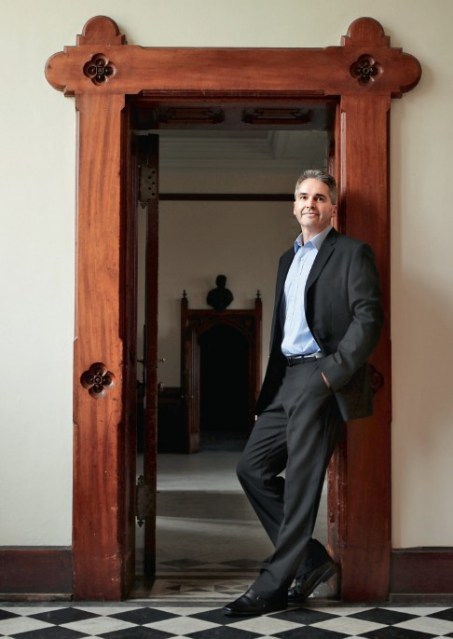Celebrities are increasingly important actors in social disputes, with their high public profiles used to amplify political campaigns and businesses using celebrity endorsements to promote their brands and justify their actions. Celebrities are particularly prominent in climate politics in endorsing green issues, educating citizens about pressing environmental concerns, as well as potentially defending implicated industries from critique.
Continue reading Coral Not Coal! The Roles of Celebrities in Climate Change ContestationCategory Archives: emotions
Review of A Friend of the Earth
Originally published in 2000, A Friend of the Earth by T. C. Boyle is a gripping, humorous and emotional novel which charts the life of committed eco-activist Ty Tierwater and his battles to confront humanity’s destruction of nature. I first encountered an excerpt from this book several years ago when reading the anthology I’m With The Bears: Short Stories From a Damaged Planet. The chapter ‘The Siskiyou, July 1989’ was something of a revelation for me then, a powerful, slow-reveal vignette in which a man, his wife, young daughter and another set out under cover of night on an arduous and forlorn protest against the logging of the virgin Oregon forest. The horror builds as you realise not only of the protestors’ helplessness when confronted by the loggers and the local police, but also in the love of a father for his daughter as they endure the physical and psychological torment of their protest. Boyle captures both the comedy and torment of a father torn between the love of his daughter and his attempts to fight against humanity’s rampant ecocide. As I started to read A Friend of the Earth this last fortnight, I recalled this tale and realised that this was a novel that speaks directly to one of the key dilemmas of our time: how one makes sense of the destruction of the natural world. Continue reading Review of A Friend of the Earth
The climate crisis in quotations
In researching the climate crisis and our civilization’s inability to respond in any coherent, rational form, I’ve been struck by the way literature (both fiction and non-fiction) often provides insight into our demise.
One side activity here has been to collect quotations from literature, film and elsewhere that resonate for me on these issues. In no particular order I’ve listed some of my favourites below (a few of these featured in our book Climate Change, Capitalism and Corporations: Processes of Creative Self-Destruction). Look forward to receiving suggestions for others to include! Continue reading The climate crisis in quotations
The corporate creation of an engaging ‘green’ spectacle
The following is an extract from our forthcoming book Climate Change, Capitalism and Corporations: Processes of Creative Self-destruction (Cambridge University Press) - out in bookshops later this year.
Corporate marketing and branding around sustainability and ‘green’ themes has undergone dynamic growth over the past decade as social concern over the environment and climate change has spiralled. Many major consumer brands – including Walmart, Ben & Jerry’s, GE, Toyota, Patagonia, Frito-Lay, Timberland, Tesco and even Shell – have embraced a ‘green’ message in their marketing.
A principal aim has been to successfully tap into consumers’ increased environmental awareness while avoiding allegations of duplicity or ‘greenwashing’. Guy Pearse has documented that there is often a disconnect between the ‘green’ boasts of corporate advertising and the reality of environmental impact. A selective focus on specific products and activities is sometimes exposed, as are assertions that are simply inaccurate; but what remains unmistakable in all such activities is an emphasis on evoking positive emotions among consumers and the public in general as part of an alternative emotionology of challenge and opportunity.
Continue reading The corporate creation of an engaging ‘green’ spectacle
The Missing Factor in Climate Change Adaptation? Human Psychology
How well do humans respond in a crisis and how we will react in the ‘new normal’ of on-going climate crisis? This is a question I’ve been pondering more and more in thinking about the human and organizational dimensions of climate change.
For instance, within the mainstream discourse of climate change policy the argument is often made that we need to move beyond climate change ‘mitigation’ and focus increasingly on ‘adaptation’. While adaptation is a critical part of responding to the impacts of climate change, the implication is that adaptation is now the ‘main game’ and will involve relatively manageable infrastructure and planning changes. The problem here is that the scale of climate change on ‘business as usual’ (BAU) projections will likely exceed manageable parameters. Physically, there are clear issues over how humanity can adapt to 4-6 degrees Celsius warming in terms of a habitable climate, extreme weather events and the demise of food supplies. Indeed, some researchers have now started to focus on ‘transformative’ adaptation. As a recent commentator noted, ‘The words that need to be in our conversations are transformation, rationing and shared sacrifice’. However, this becomes even more complex once we consider humanity’s psychological ‘adaptive capacity’ in a situation of societal breakdown.
Continue reading The Missing Factor in Climate Change Adaptation? Human Psychology
Climate Change as Culture War

The social and political debate over climate change continues unabated, despite an ever worsening procession of extreme weather events and increasingly dire scientific climate projections (on track for a 4 degree warmer world).
While there is a significant over-estimation of the extent of climate change denial within society, those who reject the phenomenon of anthropogenic climate change appear to have become even more strident, despite the overwhelming weight of climate science.
Why So Emotional? The Emotionologies of Climate Change

In a previous post I pondered the question ‘why we get so emotional about climate change?‘
I suggested a key reason was because the implications of climate change affect us in so many fundamental ways:
- our personal identities and roles (mother, father, journalist, politician);
- the stories we tell ourselves and others about who we are (where I’ve come from, where I am, who I want to be);
- our world views and ideologies (e.g. social democrat, small ‘l’ liberal, conservative, free-market libertarian).
Continue reading Why So Emotional? The Emotionologies of Climate Change
What I’m Working On
This short piece profiling my research appeared in the Australian Financial Review BOSS magazine in February last year:
I’m leading a research project examining how Australian businesses are responding to climate change. We’re focusing on how corporations are changing in response to regulatory, reputational and physical risks. These adjustments include new products and services, the measurement and reduction of emissions, pricing of carbon risk in investments and developing green organisational cultures. These are fundamental shifts.
Climate Change Abolitionists

In the last few weeks there have been a number of commentaries on the shifting nature of climate change activism. These include:
- the Sierra Club’s announcement that it will for the first time in its history engage in civil disobedience in the fight against the Keystone XL pipeline;
- an article in The Pheonix by Wen Stephenson profiling climate activist Tim DeChristopher and drawing parallels with the nineteenth century abolitionist movement against slavery; and
- a recent piece by Andrew Winston in The Guardian pointing to the same theme of a new abolitionist movement around climate change action (you can nominate your favourite ‘climate change abolitionist’ here).
Climate Change: An Emotional Business

Ever wondered why climate change stirs such strong emotions?
Despite the daily reminders of the politically partisan sub-text of much climate change discussion, this issue hit me up front and personal about a year ago.
I was at a friend’s BBQ in suburban Sydney on a sunny Saturday afternoon, when an acquaintance casually asked what I was working on. Without giving it much thought I replied ‘how businesses respond to climate change’… Stunned silence…A look of bemusement crossed my inquisitor’s face before her partner waded in with the retort, ‘You don’t believe that crap do you?’






